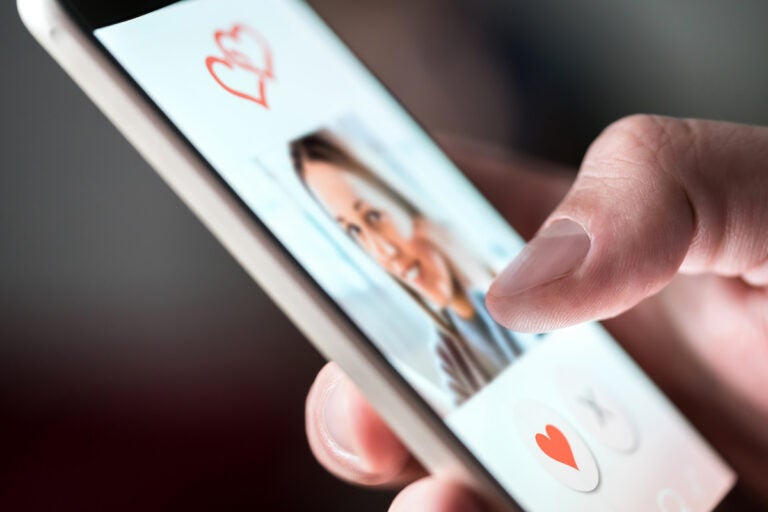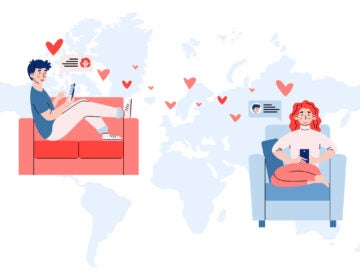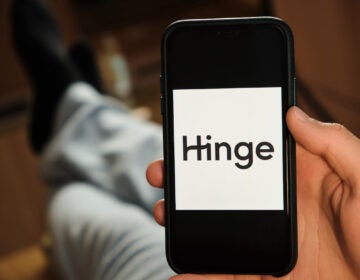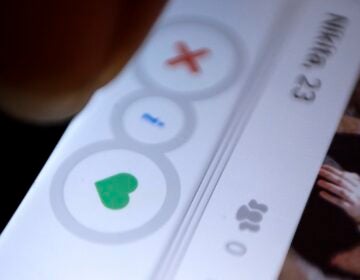Dating apps collect a lot of data, but it’s hard for researchers to access. So two scientists made their own app
Experts say the app could lead to new insights on relationships, as well as help students cope with the anxiety of dating.
Listen 10:26
A man is looking at photo of a woman on dating app. (Bigstock/TeroVesalainen)
This story is from The Pulse, a weekly health and science podcast.
Find it on Apple Podcasts, Spotify, or wherever you get your podcasts.
Sociologist Elizabeth Bruch did not set out to study online dating. She used to focus on neighborhood segregation and residential mobility, because she is interested in how people find opportunities, pick strategies, and learn from mistakes.
Then she read about researchers studying online dating, and realized her research questions apply to this setting as well.
Bruch worked with dating app companies on some studies, but never got to do quite what she wanted: for instance, she said she had ideas on how to help people find and discover matches more easily, but could not get companies to implement her ideas.
“I felt very stymied in my ability to … have a back and forth level of communication where the science can inform the app and the app can inform the science,” Bruch said. “That’s really kind of the fantasy.”
But that fantasy became a reality when she met psychologist Amie Gordon, who studies dating and romantic relationships.
Gordon has studied couples who are in a relationship, but has not studied what happens at the beginning of one. She is also interested in why people stay in or end relationships.
“People have been doing this research for decades, but we still can’t reliably predict whether any given couple is going to stay together or not, from a psychological perspective,” Gordon said.
Gordon and Bruch are both at the University of Michigan, and realized that their research interests and academic disciplines match perfectly.
“Amie and I have a lot of complementarities in our scholarship,” Bruch said. “Sociologists focus all their attention on people’s entries and exits into relationships. We spend much less time learning what happens while they’re in those relationships. And psychologists sort of focus on what happens when they’re in them, but don’t necessarily pay as much attention to the entries and the exits.”
Dating apps collect a “treasure trove” of data on relationships, but the companies usually don’t share the data with scientists. So Bruch and Gordon formed a research team and designed their own dating app for students at the University of Michigan, called Revel.
Subscribe to The Pulse
It works like most other dating apps, with a few differences: students sign a research consent form, and they also answer questions that most other dating apps do not pose to users. For instance, once they start matching and chatting with people, the app will prompt them to fill out surveys on how excited they are about that person, how similar they think they are, and why they chose to say yes or no to a match.
“That allows us to collect psychological experiences that you can’t get just from the behavioral piece of it (which is ) typically the data you get from a dating app,” Gordon said.
She added a selling point is that unlike commercial apps, they are not trying to make money from their users.
“For us, the profit is the science,” she said. “Our hope is to use that science to help people have better relationships … better dating experiences and feed it back into the app.”
Gordon said she would also like to bring matches into her lab for their first dates, which would not be a completely new idea for her research group. She already has couples do activities in her lab, while her research team tracks how they are thinking, feeling, and behaving with surveys, scientific instruments, and recordings. The ultimate goal is to figure out what predicts chemistry and compatibility.
The app has been available as a beta since December, and already has a few hundred users and more than a hundred matches. They plan a full release in the fall.
Other researchers who study relationships are excited about this idea. Luke Brunning is an ethicist at the University of Leeds in the U.K. who studies ethics and philosophy as it relates to love and relationships. He said a dating app for scientific research is interesting because it could help users learn more about themselves.
“Apps have all of this data on us and our preferences and how we behave, what we appear to like. And they don’t give us that data.”
He pointed out that people might think that they are great at conversations, or don’t have racial or height preferences, when their actual dating behavior shows otherwise.
Sociologist and relationship expert Jess Carbino used to do research at Tinder and Bumble. She said it would be exciting for them to study relationships over time, which she had also wanted to do when she worked for the dating app companies.
However, she added that the researchers at the University of Michigan will also face different constraints: people will most likely be between the ages of 18 – 30, may be focused on school rather than long-term relationships, and may behave differently if they know they are being studied.
“On the dating apps, I think most people might understand that their data are seen, but they don’t believe that they’re being studied in the same way,” Carbino said. “If people have an understanding that they’re being studied online, will they behave differently? I don’t know.”
Alexandra Solomon, clinical psychologist and host of the Reimagining Love podcast, said that should not be a problem. She teaches a popular course at Northwestern University called Marriage 101, and said the research dating app is like her working with therapy clients who are in a relationship.
“Them knowing that I’m in it with them actually forces them to narrate their experience. It forces them to have part of themselves in the experience and part of themselves observing and translating the experience to me, their therapist,” she said. “That is how you build self-awareness. That’s how you build introspection. And those are essential skills not just for dating, but for sustaining a lasting relationship.”
She said the research dating app might actually help people who are looking for dates.
“Dating is incredibly confusing. It is inherently anxiety provoking,” she said. “One of the ways that human beings best cope with anxiety and uncertainty is by being helpful. And so these daters then get to say to themselves, I’m being helpful to the world of science. I’m being helpful to these researchers.”
WHYY is your source for fact-based, in-depth journalism and information. As a nonprofit organization, we rely on financial support from readers like you. Please give today.







